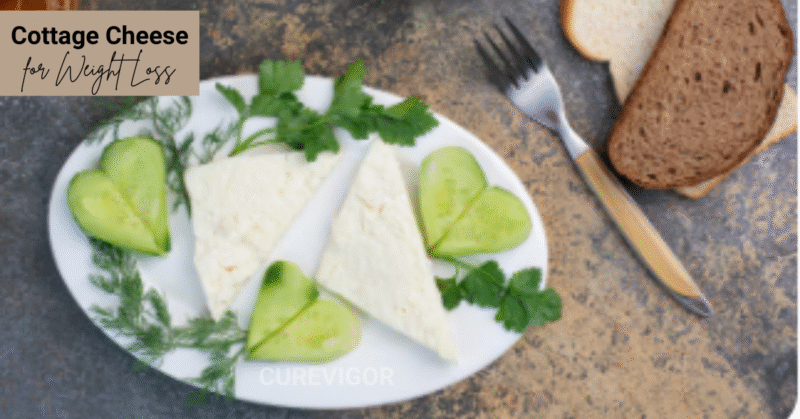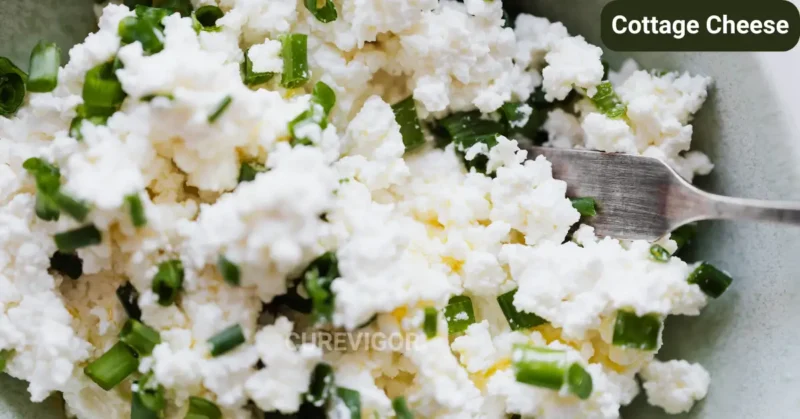Unlock the power of cottage cheese for weight loss! This definitive guide reveals how its high protein, low calories, and key nutrients can boost metabolism, curb cravings, and transform your health.
Thank you for reading this post, don't forget to subscribe!How to Use Cottage Cheese for Weight Loss and Better Health
For decades, cottage cheese has been a staple in the diets of athletes and health enthusiasts. But beyond its classic status, it’s emerging as a true powerhouse for anyone on a weight loss journey.
This isn’t just about eating a low-calorie food; it’s about leveraging a unique nutritional profile to achieve your goals more effectively. This comprehensive guide will dive deep into the science and strategy behind using cottage cheese for sustainable weight loss and overall better health.

Why Cottage Cheese is a Weight Loss Superfood
Understanding why cottage cheese works so well is the first step to using it effectively. Its reputation isn’t just hype; it’s built on a solid nutritional foundation.
Cottage cheese is a soft and fresh cheese made from the curds of cow’s milk. Unlike aged cheeses, it is not pressed or aged, contributing to its light, creamy texture.
It has a mild flavour and can be enjoyed independently or incorporated into various dishes, including salads, baked goods, and desserts. Cottage cheese is often used in healthy diets because it is high in protein and relatively low in calories.
Why is it lumpy?
Curdling milk is the process that gives cottage cheese its lumpy texture. When manufacturing cheese, the milk is formed with an acid (vinegar, lemon juice, etc.) or an enzyme (rennet), which causes the curds (milk solids) to separate from the liquid (whey).
These curds retain their unique shape even after being drained without being completely compressed into tiny lumps. This unique technique results in cottage cheese’s distinctive lumpy texture.
The Powerful Nutrient Profile of Cottage Cheese
At its core, cottage cheese is fresh cheese curds known for its mild flavor and versatile texture. But its true value lies in what it packs inside a single serving.
Essential Micronutrients: It’s a rich source of Calcium, Phosphorus, Selenium, Vitamin B12, and Riboflavin (B2), all of which play crucial roles in metabolism and energy production.
High-Quality Protein: This is its star feature. A one-cup (226g) serving of low-fat (1% or 2%) cottage cheese delivers a whopping 28 grams of protein for only about 160-200 calories.
Low in Calories and Fat: Choosing low-fat or fat-free varieties keeps the calorie count low, creating the essential calorie deficit needed for weight loss.
How is Cottage Cheese Made?
Cottage cheese is made through a simple curdling process. First, milk is heated, and then an acid, such as vinegar, lemon juice, or rennet (an enzyme), is added to curdle the milk. This causes the milk solids (curds) to separate from the liquid (whey).
Once the curds form, they are cut into small pieces and gently cooked to release more whey. The curds are drained and rinsed to get rid of extra whey after they are cooked through. To improve the texture and flavor, the curds are salted and occasionally combined with cream, giving rise to the well-known lumpy, creamy cottage cheese.
Cottage Cheese: A Food Rich in Nutrients
Cottage cheese is rich in nutrients, though its nutritional value varies based on the fat content of the milk used and the amount of sodium added. The following nutrients are available in a half-cup (113 g) of low-fat cottage cheese (1% milk fat):
- 81 calories
- 14 g of Protein
- 3 g of carbohydrates
- Fat 1g
- 29% of the Daily Value (DV) for vitamin B12
- 20% of the DV is sodium
- 19% of the DV is selenium
- 15% of the DV is riboflavin
- 13% of the DV is phosphorus
- 5% of the DV is calcium
- 4% of the DV is folate.
It also provides small amounts of vitamin B6, choline, zinc, and copper (less than 5% of the DV). About 3% of cottage cheese’s carbohydrates come from lactose, a milk sugar that some people may find difficult to digest. Suppose you eat a lot of cottage cheese.
Choose low-sodium or sodium-free options to avoid increased blood pressure and heart disease risk from excessive salt.
The Science Behind Cottage Cheese and Satiety
The journey to weight loss is often sabotaged by hunger. Cottage cheese directly addresses this problem.
- Protein’s Power on Appetite Hormones: High-protein foods like cottage cheese increase the production of hormones like Peptide YY (PYY) and GLP-1, which signal fullness to your brain. Simultaneously, they reduce levels of the hunger hormone ghrelin.
- The Thermic Effect of Food (TEF): Protein has a higher TEF than carbs or fats, meaning your body burns more calories simply digesting it. This can boost your metabolism by 15-30%, compared to 5-10% for carbs and 0-3% for fats.
How to Incorporate Cottage Cheese for Weight Loss into Your Plan
Knowing it’s healthy is one thing; knowing how to eat it is another. Here’s your practical strategy.
Choosing the Right Cottage Cheese for Weight Loss

Not all cottage cheese is created equal. Make the best choice for your goals:
- Fat Content: For weight loss, low-fat (1% or 2%) is generally ideal. It offers the best balance of high protein and low calories. While full-fat (4%) has its benefits (like increased satiety), it comes with significantly more calories.
- Sodium Levels: Check the label. Some brands can be high in sodium. Opt for brands with lower sodium content, especially if you are watching your blood pressure.
- Ingredients List: The best cottage cheese has a short ingredients list: milk, cream, salt, and live active cultures. Avoid varieties with added gums, stabilizers, or sweeteners.
Meal Ideas and Recipes of Cottage Cheese for Weight Loss

Cottage cheese’s neutral flavor makes it incredibly versatile. Here’s how to use it throughout your day:
Breakfast: Fuel Your Morning
- Classic & Simple: Top 1/2 cup of cottage cheese with fresh berries, a sprinkle of cinnamon, and a few chopped almonds for healthy fats.
- Cottage Cheese Scramble: Blend 1/4 cup of cottage cheese into your eggs while scrambling them. They become incredibly fluffy and packed with extra protein.
- Protein-Packed Smoothie: Blend 1/2 cup cottage cheese with a cup of unsweetened almond milk, a handful of spinach, half a banana, and a tablespoon of peanut butter.
Lunch: A Midday Power-Up
- Cottage Cheese Bowl: Use cottage cheese as a base like you would yogurt. Add cucumber, cherry tomatoes, chickpeas, a drizzle of olive oil, and a pinch of black pepper.
- Healthy Dip: Mix cottage cheese with herbs like dill, chives, and garlic powder. Use it as a dip for raw vegetables like carrots, bell peppers, and cucumbers.
- Toast Topper: Spread cottage cheese on whole-grain toast and top with sliced avocado and a sprinkle of chili flakes or smoked salmon and fresh dill.
Dinner: Enhance Your Main Course
- Creamy Pasta Sauce: Blend cottage cheese with garlic, lemon juice, and basil to create a creamy, high-protein sauce for whole-wheat pasta or zucchini noodles.
- Stuffed Vegetables: Use it as a filling for baked potatoes or as part of a mixture for stuffing bell peppers or mushrooms.
Snack: Curb Cravings
- Pre-Bed Snack: A small bowl (1/2 cup) of cottage cheese about 30-60 minutes before bed provides a slow-releasing casein protein that fuels your muscles overnight and can prevent next-morning hunger.
- Post-Workout Recovery: Pair it with a piece of fruit to quickly replenish glycogen stores and repair muscle tissue after a workout.
Beyond Weight Loss: Additional Health Benefits
While weight loss is a primary goal, the benefits of cottage cheese extend much further, contributing to your overall well-being.
Supports Muscle Growth and Recovery
The high protein content, rich in all nine essential amino acids (especially leucine), is critical for repairing and building muscle tissue. This is vital for maintaining metabolism, as muscle burns more calories at rest than fat.
Promotes Strong Bone Health
Cottage cheese is an excellent source of calcium and phosphorus, two minerals that are the primary building blocks of your bones. Regular consumption can help maintain bone density and prevent osteoporosis.
May Enhance Digestive Health
Many brands contain live and active cultures (probiotics). These beneficial bacteria can help balance your gut microbiome, improving digestion, enhancing nutrient absorption, and even boosting immune function.
FAQs on Cottage Cheese for Weight Loss
Q. Is cottage cheese healthier than Greek yogurt for weight loss?
Both are stellar choices, but they serve slightly different roles. Cottage cheese typically offers a comparable amount of protein with often fewer carbohydrates and sugars per serving, making it excellent for strict calorie control. Greek yogurt is renowned for its probiotic content, which is fantastic for gut health.
The “healthier” option truly depends on your personal health goals; for pure protein density and satiety, cottage cheese often has a slight edge, but incorporating both provides a wonderful variety of nutrients.
Q. When is the best time to eat cottage cheese for weight loss?
The beauty of cottage cheese is its versatility throughout the day. Consuming it for breakfast can kickstart your metabolism and keep you full for hours, preventing mid-morning snacking.
As a pre-bedtime snack, its casein protein provides a slow-release amino acid drip that repairs muscles overnight, optimizing your metabolism while you sleep. Ultimately, the best time is whenever you need a high-protein, low-calorie meal to align with your hunger cues and schedule.
Q. Can I eat cottage cheese every day?
Absolutely, for most individuals, daily consumption is not only safe but highly beneficial. Its consistent daily intake ensures a steady supply of high-quality protein and calcium, supporting long-term weight management and bone health. However, if you have a known dairy sensitivity or lactose intolerance, it’s prudent to monitor your body’s response, start with smaller portions, or opt for lactose-free versions. Always listen to your body and consult a healthcare provider if you have specific concerns.
Q. What are the health benefits of cottage cheese?
Cottage cheese offers numerous health benefits due to its rich nutrient profile. It is high in protein, which supports muscle growth and repair. It contains essential vitamins and minerals such as B, calcium, phosphorus, and selenium, contributing to energy production, brain health, bone strength, and antioxidant defence.
Due to its high protein and low-calorie content, cottage cheese can aid in weight management, increase satiety, and boost metabolism. Additionally, it may enhance digestive health through probiotics found in certain varieties.
Q. What’s the difference between low-fat and full-fat cottage cheese for weight loss?
The core difference lies in calorie density and satiety mechanisms. Low-fat (1% or 2%) cottage cheese provides maximum protein for the fewest calories, which is ideal for creating a consistent calorie deficit.
Full-fat (4%) versions have more calories from fat but can promote a greater feeling of fullness and satisfaction, which may help some people eat less overall. For dedicated weight loss, low-fat is typically recommended, but those on a keto or low-carb plan may prefer full-fat for its macronutrient profile.
Final Thoughts: Transform Your Journey with Cottage Cheese for Weight Loss
Forget restrictive fads and hunger pangs. The secret to sustainable weight loss might have been sitting in your dairy aisle all along. Cottage cheese for weight loss isn’t just a trend; it’s a proven strategy backed by science.
By harnessing the power of slow-digesting protein to crush cravings, fuel your metabolism, and build lean muscle, this humble superfood becomes your ultimate ally.
This isn’t about adding just another food to your diet—it’s about adding a tool. A tool that is versatile, delicious, and incredibly effective. So, the next time you’re planning a meal, remember the mighty power of cottage cheese.
Make it your go-to breakfast, your secret snack weapon, and your satisfying dinner hack. Embrace it, and watch your health transform, one creamy, protein-packed spoonful at a time. Your future self will thank you.
Read more articles on Health and Wellness Tips.
You might like to read:

